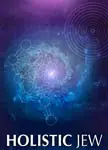HARMONY IN BALANCE
TEN COMMANDMENTS
adapted from Meta Parshiyot by R David Wolfe-Blank, Living Torah by R Aryeh Kaplan, and Sefaria.org online
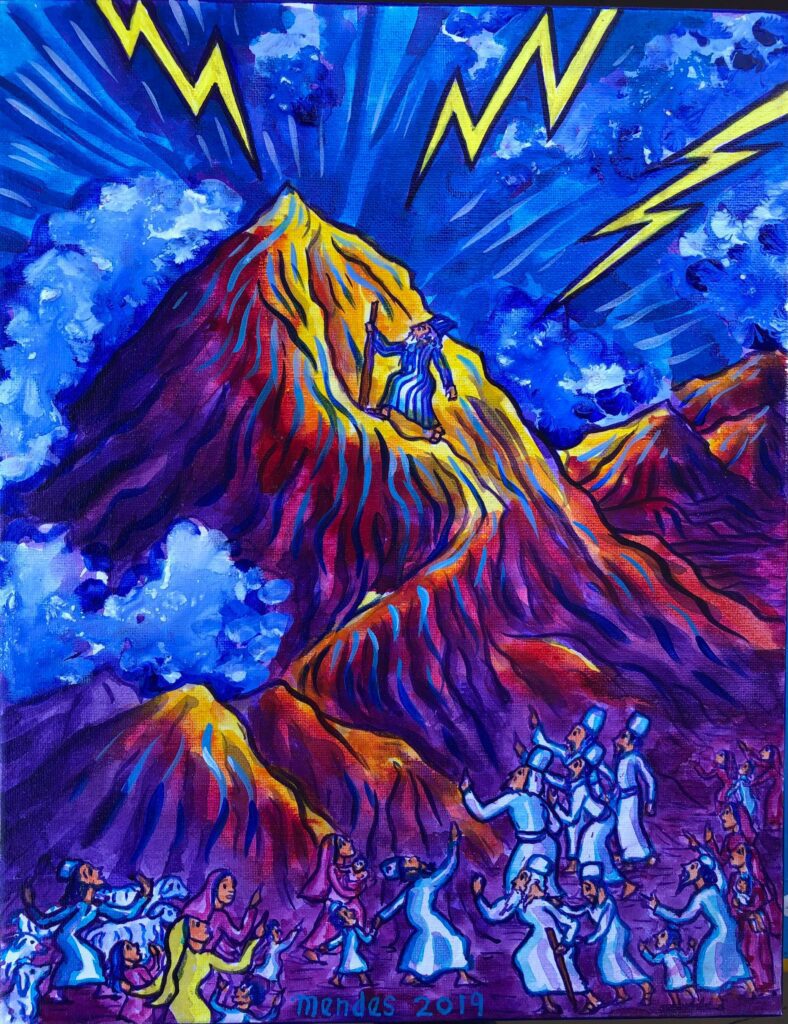
HIGHLIGHTS IN YITRO
MOSHE REUNITES WITH HIS FAMILY
Yitro, Mosheh‘s father in law the Midian Priest, brings his daughter Tzipporah, and their children near the Yisrael camp. He sends word to Mosheh and soon, the family is reunited.
Yitro had already heard about the wonders Havayah did. They sit together and Mosheh tells Yitro all about the wonders Havayah manifested for the sake of Yisrael and also about his frustrations. They praise Havayah and Yitro brings a sacrifice for Havayah. Yitro breaks bread with Mosheh, Aharon, and the Yisrael elders.
The next morning, Yitro gives Mosheh fatherly advice. Leading the Yisrael people is an enormous task and far too much responsibility for one person. Moshe must delegate responsibility in order to sustain the community. Mosheh took his father-in-law’s advice to heart and a structured leadership was developed.
PROPOSAL DIVINE
The verses in Torah just before the giving of the ten commandments, sound like poetic words of courtship. It is like an ancient marriage proposal from The Holy One of Blessing to Clal Yisrael, the Yisrael community.
אַתֶּ֣ם רְאִיתֶ֔ם אֲשֶׁ֥ר עָשִׂ֖יתִי לְמִצְרָ֑יִם וָאֶשָּׂ֤א אֶתְכֶם֙ עַל־כַּנְפֵ֣י נְשָׁרִ֔ים וָאָבִ֥א אֶתְכֶ֖ם אֵלָֽי׃
‘You have seen what I did in Mitzraim, carrying you on eagles’ wings and bringing you to Me.
וְעַתָּ֗ה אִם־שָׁמ֤וֹעַ תִּשְׁמְעוּ֙ בְּקֹלִ֔י וּשְׁמַרְתֶּ֖ם אֶת־בְּרִיתִ֑י וִהְיִ֨יתֶם לִ֤י סְגֻלָּה֙ מִכׇּל־הָ֣עַמִּ֔ים כִּי־לִ֖י כׇּל־הָאָֽרֶץ׃
Now, if you really really hear my voice, and keep My Covenant (with you), then, you will be My special treasure amongst all the nations, (even though), all the earth is Mine.
…וְאַתֶּ֧ם תִּהְיוּ־לִ֛י מַמְלֶ֥כֶת כֹּהֲנִ֖ים וְג֣וֹי קָד֑וֹשׁ
You shall be a sovereignty of priests and a nation sacred to Me.
Exodus 19:4-5
adapted from Sefaria
RECEIVING TEN COMMANDMENTS
The Yisrael people are instructed to prepare over three days. They are to wash their clothes and cultivate holiness, with Mosheh‘s help. A line of safety is set around Mt. Sinai, not to be crossed by human or animal. The anticipation builds.
There was thunder, lightening with a heavy cloud upon the mountain. The ram’s horn blasted long and loud. The people were trembling and transfixed at the bottom of the mountain. The Divine Presence brought smoke and fire, the smoke rose up in wondrous abundance. Then, it grew still until even the animals and birds are silent. Then, Havayah – God who Is, Was, and Will Be’s – word is heard.
This is called, the giving of the ten commandments. They end with, “Do not envy”. A simple request, yet, not so easy to do.
SYNESTHESIA
וְכׇל־הָעָם֩ רֹאִ֨ים אֶת־הַקּוֹלֹ֜ת וְאֶת־הַלַּפִּידִ֗ם וְאֵת֙ ק֣וֹל הַשֹּׁפָ֔ר וְאֶת־הָהָ֖ר עָשֵׁ֑ן וַיַּ֤רְא הָעָם֙וַיָּנֻ֔עוּ וַיַּֽעַמְד֖וּ מֵֽרָחֹֽק׃
All the people saw the sounds, the flames, the blast of the ram’s horn and the mountain smoking. ; and when the people saw it, they fell back and stood at a distance.
Exodus 20:15
This verse describes an inner sense of what it was like at Sinai. The Divine Presence is beyond powerful, the sensory input to the human five senses was beyond what any of the Yisrael family (or anyone) was accustomed to receiving. As a result, that overloaded senses blended together and the people, “saw the sounds”.
(There are meditative methods which cultivate an experience of synesthesia, like Continuum Movement Liquid Kabbalah.)
BOUNDARIES AT SINAI
Be ready on the third day, do not go near a woman.
Ex 19:15
This Torah verse is problematic for at least half of the Jewish population. It feels untrue at a very deep level.
STANDING AGAIN AT SINAI
The specific (halakhic) issue at stake is ritual impurity; an emission of semen renders both a man and his female partner temporarily unfit to approach the sacred (Lev15:16-18). But Moses does not say, “Men and women, do not go near each other.” Moses addresses the community only as men. At the central moment of Jewish history, women are invisible. If the covenant is a covenant with all generations and the Torah readings recreate the past for succeeding generations, then we are involved in a cycle which involves the continual marginalization of women.
The issue emerges out of a contradiction between the text and the felt experience of many Jewish women. For if Moses’ words come as a shock and affront it is because women have always known or assumed our presence at Sinai; the passage seems to deny what we have always taken for granted. Of course we were at Sinai: how is it then that the text could imply that we were not there.
The contradiction between the Torah text and our experience is crucial; for construed in a certain way, it is a potential bridge to a new relationship with the tradition. To accept our absence from Sinai would be to allow the male text to define us and our connection to Judaism. To stand on the ground of that experience, on the other hand, to start with the certainty of our membership in our people is to be forced to remember and recreate its history, to reshape Torah. It is to move from anger at the tradition, through anger to empowerment. It is to begin the journey toward creation of a feminist Judaism.
Judith Plaskow
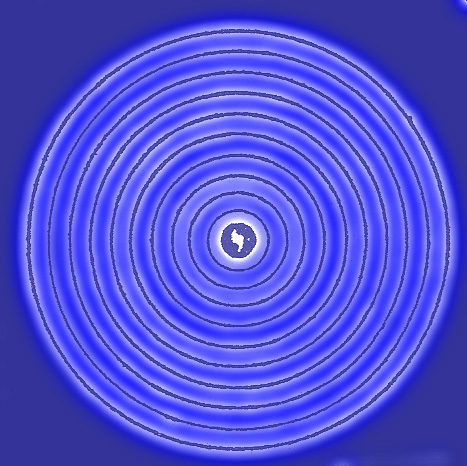
Female Tree of Life 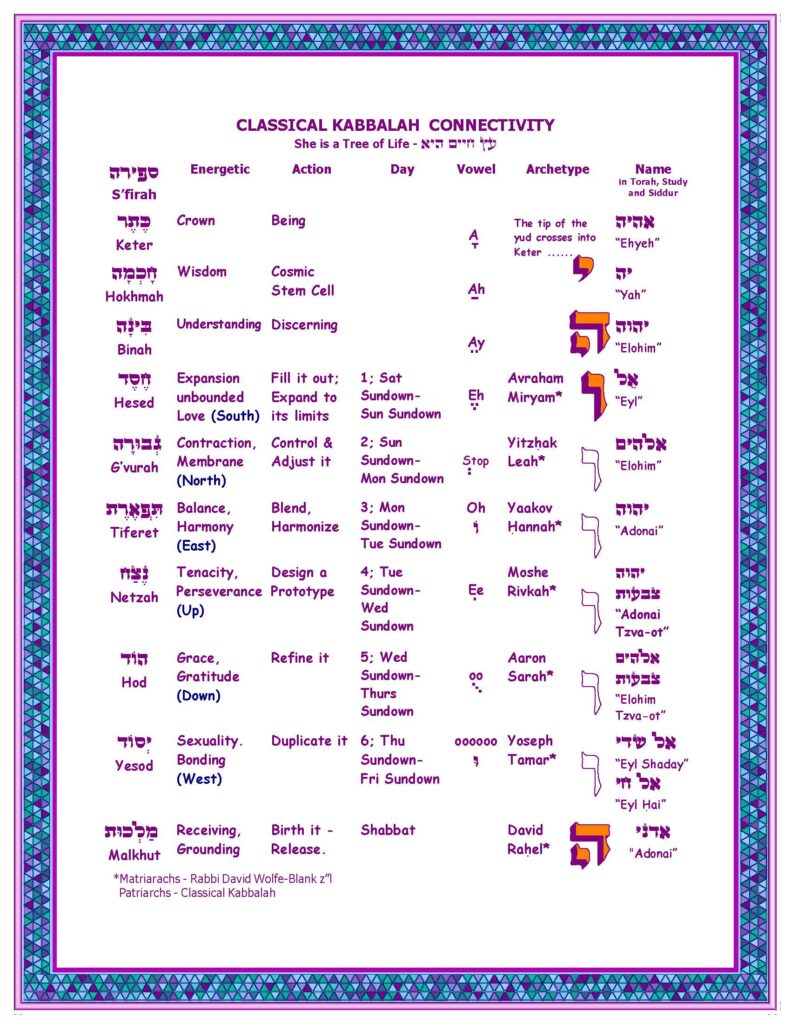
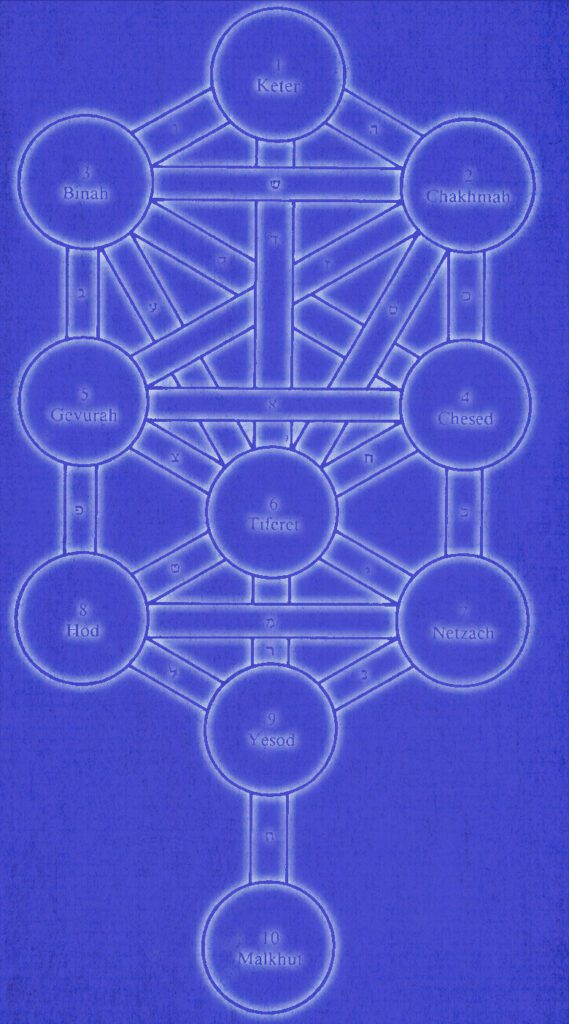
Male Tree of Life
YITRO IS TIFERET IN TIFERET IN THE S’FIRAH CYCLE
Tiferet is the heart center of the Tree of Life. Therefore, Tiferet in Tiferet is the center of the center. Receiving the ten commandments at Sinai is central in Jewish lore, psyche, and tradition. The fact that the giving of the ten commandments correlates with Tiferet in Tiferet, heart of the heart strongly validates the value of associating the Parashah with the S’firah cycle. Barukh Hashem.
